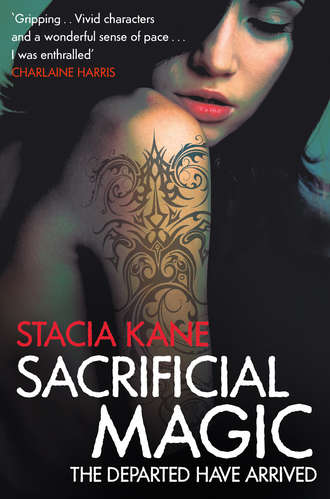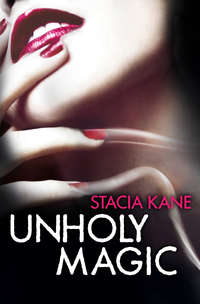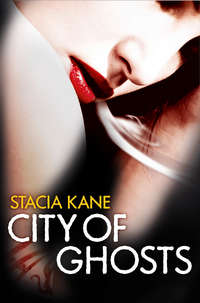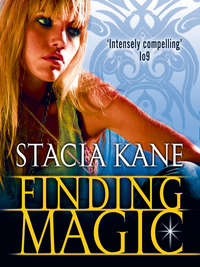
Полная версия
Sacrificial Magic
“Good. This case was previously given to Aros Burnett.” He looked up at her gasp, the tiny sound she tried not to utter but which slipped out before she could stop it. “Yes. Aros found it … particularly difficult, and he gave it up. Gave up his post in Triumph City as well, as I see you remember.”
Her neck practically creaked as she nodded. Of course she remembered. The halls had barely stopped buzzing about it; it had only been eight or nine days.
“Aros was unable to give us a satisfactory solution. You’ll see his notes in the file. They become rather—jumbled, near the end, I’m afraid. But we feel strongly that you will be able to bring us an answer. We have seen the Fact and Truth of your skill many times. I look forward to seeing your resolution.”
“Thanks.” The file hovered in his hand, just over his desk; she took it and started to open it. “Where is it?”
“Well. That is another reason you were chosen, in truth. ’Tis not too far from your residence. You are familiar with Mercy Lewis Second School? In Downside, on—”
“Twenty-second,” she finished for him, barely noticing her own rudeness as she cut him off. Barely noticing anything except that address, staring at her from the original report in the file. Twenty-second and Foster.
Right in the middle of Slobag’s territory.
Chapter Five
The dead invaded the schools, hiding in the shadows inside to turn the students into soldiers of death themselves.
—The Book of Truth, Origins, Article 57
The parking lot outside Mercy Lewis Second School hardly looked like a parking lot at all. If not for the four or five battered cars parked at odd angles among the gravel and weeds, Chess would have thought it was just a vacant lot like any other.
Four or five battered cars, and one sleek shiny coupe, gunmetal gray, the same color as Chess’s new car, although hers wasn’t as stylish. Or as expensive. As unobtrusively as possible she wandered over to where the car sat, pretending to be interested in the view on the other side of the rusty, torn chain-link fence, and committed the license plate number to her temporary memory. She’d write it down as soon as she got inside.
Despite everything else—and really, given its location and the fire the night before, this case couldn’t have been worse for her—her spirits lifted as she headed up the cracked concrete path to the large front doors. Working again. Something else to focus on, something she could actually do something about, something with actual procedures to follow and clues she was trained to understand. That felt good.
Mercy Lewis Second School—formerly an embassy for some South Pacific country, she thought—was clearly a product of that phase of architecture that had believed bland was better. It just … sat there, dull and brown, staring out at the dirty streets and crumbling buildings with an air of resignation. Whatever had happened to it, whatever changed in the world, it would remain, glowering at them all, suffering the crowds of teenagers abusing it every day.
It could join the damn club. She made her way to the graffiti-covered entrance, pulled open a heavy door that gave a loud shriek of protest. Great. Well, good to know, anyway. When and if she came back at night with her Hand, this was not the entrance to use. She made a note—writing down the license number of the too-expensive car in the lot while she was at it so she could let it drop from her memory—and followed the faded signs to the office down the hall.
The itching started when she’d made it about halfway down. Not withdrawals—not even possible, she’d dosed up right before she got out of the car—but something worse, something that told her three Cepts wasn’t going to be enough and made her wish she’d washed them down with a couple of shots, too.
Second school. Any school. She couldn’t say the worst memories of her life came from schools—far, far from it—but the ones she did have weren’t fucking good, that was for sure. The memories she had of when she’d gone; when she’d been forced to go. All of her foster parents made her, because if her attendance dropped they wouldn’t get paid anymore, but none of them gave a shit if she actually learned anything, and her teachers hadn’t either.
Those voices still echoed with every step she took. Just the air in the building, that particular chalkboard-antiseptic-dust-and-despair smell of school, reminded her where she was, made her remember how it felt and how much she’d hated it. The cold metal lockers lining the walls watched her, considered her, as her boots clicked on the polished concrete floors. She didn’t care what they thought, or what anyone she was about to meet thought, but she still felt that invisible cloud of judgment that seemed to hover near the ceiling of every school, ready to descend on anyone unlucky enough to walk beneath it.
Whatever. She’d never gone to this school, and it wasn’t her prison now. She was an adult, she was a fucking Churchwitch, and someone in this school was trying to scare people and scam some money out of the Church. So she would catch them. It was as simple as that, and she knew it and believed it as strongly and purely as she knew Facts were Truth.
Although … who would get the money, if the Church ended up paying a settlement? The Church owned the school, of course, and ran it, at least ostensibly. The Church wouldn’t pay a settlement to itself. So … another note in her pad. Who profits?
The classroom doors she passed were closed. Through the narrow windows in each of them she caught glimpses of chalkboards and teaching Goodys standing before them, the occasional slice of backs bent over desks. Boredom and sadness seeped through the walls.
Finally she reached the end of the hall, another closed door. administration was written on it in peeling black letters, with “Fuck the” scratched into the glass above it. Heh. Without knocking she pushed it open, got a good visual snapshot of three women standing around chatting before they stopped to look at her.
The one behind the desk, an enormous woman—she had to be close to six feet tall, and solidly built—with thin, frizzy brownish hair hanging limp from the top of her head, gave her the sort of disapproving smile Chess thought people with minor authority must practice in front of mirrors. Inexpertly applied red lipstick made her mouth look like a wound. “Can I help you, Miss?”
The other two stepped away from the desk, almost in a flanking motion. Had they been Downside kids and not school ladies Chess would have thought they were getting ready to jump her. Then again, maybe they were. Just not physically.
“I’m Cesaria Putnam.” She didn’t offer her hand. “From the Church. I’ve come about your haunting.”
A moment of silence, as if none of them knew what to say. What the hell? They had to be aware of the procedure, they’d had another Debunker out there already. Then one of the women outside the desk, petite with red hair and a horrible baggy plaid dress, gave her a tentative smile. “Of course, yes. Please come in and sit down. Can we get you anything? Coffee, tea?”
“No thanks.” Like she’d ever drink anything a subject gave her, at least in a situation like this. She did sit down, though, on the dingy couch that sank too far beneath her, so her ass hung lower than her knees. Getting out of that would be fun.
The third woman just looked at her, an odd sort of smile on her face. As if she knew something Chess didn’t and was waiting for Chess to figure it out, or she was waiting for Chess to speak so she could belittle her. A smug look. Chess didn’t like it, and she didn’t think she liked the woman, although something in the way she stood, the tilt of her head and that smirk, reminded Chess for some absurd reason of Lex.
Yes, the woman was Asian, but that certainly wasn’t it. She didn’t know what it was. She’d seen other men who had some sort of Lex-like quality about them, but never a woman. Oh well. There was a first time for everything. Women could be smug bastards, too.
Then the woman shifted, and the resemblance disappeared, leaving just an attractive woman with straight, shiny dark hair in a casual knot at the base of her neck. Compared to the other two she looked especially gorgeous, in her black pencil skirt and loose white Oxford shirt with the sleeves rolled up.
“We weren’t sure we would get someone else,” she said, one graceful elbow propped on the counter. “Aros left so abruptly, and we haven’t heard anything since.”
Chess grabbed her notepad. “He told you he wouldn’t be back?”
The women smiled at each other, as though Chess had just said something adorably naïve. Bitches.
“We got that impression,” Horrible Plaid said, “when he screamed at us all that he was never stepping foot in this place again, broke a window, and ran off in the middle of the day.”
Damn. What exactly had he encountered?
She didn’t know Aros; he’d been a recent transfer. So she had no idea how tough he was, or what kinds of cases he’d handled wherever it was he’d come from. She made a quick note to ask Elder Griffin about it, and pushed the tiny flash of sadness out of her head.
“He never seemed comfortable here,” Big Frizzy—the name plate on the edge of the desk read laurie barr—said. Or rather, deigned to say. She still looked at Chess as if Chess was something rotten that had melded with the refrigerator shelf. Whatever.
“Do you have any idea why that might be?”
“Working with youth isn’t for everyone.”
“Yes, but, did he seem to have any particular troubles?” It really wasn’t her business; it really wasn’t part of the case. But she couldn’t help being curious, and who knew. Maybe there was something there. If someone had been harassing him, that might be a good lead.
Or it might not. Anti-Church sentiment wasn’t too widespread in Downside—most people there didn’t give a fuck about the Church, either pro or con, save being suspicious or getting the hell out of her way when they saw her ink—but on this side of town, that changed. That could very well account for the Asian woman’s smirks, too. People whose religion had centered on ancestor worship didn’t tend to appreciate the government that told them they weren’t allowed to do that anymore, not without paying a hefty fee and going through the Church itself.
This just kept getting better and better. As if it wasn’t shitty enough working a case that would put her in more contact with the wrong side of town, and how that would look—she was not looking forward to Terrible’s reaction when he found out where she’d be spending large chunks of her time—it was in an area where she’d be even more unwelcome than usual.
“He just seemed nervous,” the Asian woman replied. None of them had volunteered their names yet. How polite of them. “He seemed to particularly dislike Vernal Sze and his friends. I believe he was afraid of them.”
“Did he have reason to be?”
She shrugged. “I don’t think so. They like to look tough, but they’re really not. They just haven’t been shown enough examples of proper behavior.”
Laurie gave an eye-roll so elaborate Chess almost expected her head to topple off. Horrible Plaid noticed—or rather, noticed Chess noticing—and said, “Beulah is our Community Liaison. She’s not a teacher.”
Chess waited, but none of them explained what that meant or why it mattered. Okay. “And what does that entail?”
The Asian woman—Beulah—smiled that smug smile again, her eyes focused tight on Chess’s face. What the fuck? Those Significant Looks were starting to creep her out. “I’m actually here on a volunteer basis several days a week, working with students and helping to foster a better relationship between the school administration and the community.”
Chess had never heard of such a thing. She supposed it made sense, given that most school administrators were Church employees—most of them were Elders, actually—and that might be tense in this area. She couldn’t see it being such a huge deal that they needed community outreach, but what the fuck did she know? Her pretty much sole experience with anyone on this side of town was Lex, and he didn’t care about anything enough to get angry about it.
“Who handles that?” she asked. “I mean, is there a charity set up that you work for, or … ?”
“I’m paid out of school overflow funds,” Beulah said. “Whatever the school manages to raise through donations or other outside sources, beyond their annual budget, gets put into a separate account. That’s divided among several programs, and mine is the largest one. So technically I am a school employee, but I administer my own program.”
Must be nice, Chess thought. Laurie seemed to agree; she watched Beulah with a look of such open hostility that Chess almost expected her to start hitting her.
Something to think about later, because hadn’t Beulah just given her a very important piece of information? So any extra cash in the school coffers went to Beulah—well, Beulah and whoever ran these other programs. She’d need to see those records. Aros hadn’t included those, or even mentioned them, in his file.
But for now … she stood up. “Maybe one of you could take me around? And if you could show me where entities have been seen, or anyone experienced anything unusual, that would be great.”
Chapter Six
Death simply means the opportunity to live on in eternity. And that is Fact, which makes it Truth.
—The Church and You, a pamphlet by Elder Barrett
Horrible Plaid’s name—surprise!—wasn’t Horrible Plaid. It was Monica—Monica Freeman—and she was the secretary to Master Elder Conrad, the school’s headmaster. She told Chess this with self-deprecating pride, as though she expected Chess to be impressed but wanted to seem like she didn’t, as though she thought it was silly to expect it.
Which of course it was. Chess tried not to mistrust the woman—mistrust all of them—on general principles, but she couldn’t help it. Even if she hadn’t been there investigating a possible haunting she would have mistrusted them. They might claim to be Church—at least the Elders did, and the teaching Goodys did—but they weren’t, not really. They didn’t give a fuck about any of the students, about anyone but themselves.
“In here is the theater.” Monica leaned against the thick door, its wood stained a horrible orangey color. Who the hell had picked that color? Almost every school she’d ever seen had it, and it looked awful in every one of them. “The first sighting was in here.”
Now they were getting somewhere. “Okay. Can we go in? And you can tell me what happened?”
“No one’s been in here since then.”
Chess raised her eyebrows. Okay. Monica didn’t seem to understand direct questions. “Can we go in, and you can tell me what happened?”
“I can unlock it.” Beulah pulled a set of keys from somewhere. Where she had room to hide them in that skirt Chess had no idea, although she had to admit the skirt was gorgeous. Either “community outreach” paid awfully well, or Beulah had a sugar daddy. Or simply lived beyond her means. Checking her financials would probably be a good idea.
Monica moved out of Beulah’s way a little too fast, as if she was afraid Beulah would mow her down. Funny. They’d all seemed perfectly friendly when Chess walked into the office.
The door opened with a creak right out of a horror film. For fuck’s sake, was the school budget really so tight they couldn’t afford a can of fucking WD-40? Chess had never seen a building so creaky in her life. Another note to make.
Through the open door she saw only darkness; the air breathing out at her smelled stale and felt cold against her skin. An air conditioner still hummed somewhere inside.
“No one’s been in here? Why? And for how long?”
Monica answered, standing right behind her. “It’s been about three weeks, I guess. Well, Aros might have been in here without telling us, but three weeks since any of us have been inside.”
If Aros had entered the theater without even bothering to lubricate that hinge, then something was seriously wrong with the man. Oh well. “Because of the haunting?”
“Of course.” Beulah pushed past both of them. For a moment her head and lower body disappeared, her white blouse just a faint glow in the gloom, before something slammed like metal against metal and the lights came on.
Not that it made much difference. Shadows still lurked along the walls and between the rows of seats, which rose stadium-style from the sunken stage at the front to a small booth in the center at the back. It wasn’t a large room, really, but then it wasn’t a large school. Maybe a hundred seats, a hundred and fifty? Drama didn’t seem to be a popular activity at Mercy Lewis. It hadn’t been at any school Chess had ever attended.
Beulah walked toward the stage, her slim figure appearing and reappearing between the rows like a lion through tall grass. “A few students were in here after school, about three weeks ago.”
“Where they shouldn’t have been,” Monica muttered.
“They were hanging out on the stage,” Beulah continued, ignoring Monica. Ignoring, too, Monica’s next snide interruption, which was the word “Drinking.”
Beulah glared at Monica. “Talking. According to Vernal.”
“This is the person you mentioned before? The one Aros was afraid of?” Chess asked.
“Yes. Good memory. Anyway. They were in here talking, Vernal and three of his friends, when the ghost appeared. They said it came through the curtains there”—she pointed to the right—“and started moving along that wall. Then it apparently noticed them and came toward them, which is when they ran.”
“Did it follow them out of the theater? What did it look like, did they say?”
“It didn’t follow them,” Monica said. “And they said it looked like Lucy McShane.”
Chess looked at her blankly. It was always so cool when people expected her to know things there was no possible way she could know. Of course she was familiar with all of the famous ghosts and hauntings; the special team that still lived in the Tower of London, for example, just to contain them all. Edward DeWitt, the ghost of a murder victim who was so hell-bent on revenge it took them four weeks to track him down and Banish him. And of course the Fallow Creek Five, and the suburb they’d turned into a literal ghost town back in 2007.
But nowhere on that list, and it was quite an extensive list, did anyone named Lucy McShane appear.
Either Beulah saw her blank look and sympathized, or Beulah saw her blank look and patronized. Whatever her motive, at least she told the fucking story. “She was a suicide from just after this building was converted into a school, maybe 1999, 2000? According to the story, she was in the school play and fell in love with the director. He seduced her, and then when she got pregnant he dumped her. So she flung herself from the lighting platform up there.”
Chess glanced up. Above her head a rack of lights hung in a gentle arc, white cone-shaped fixtures aimed at the stage. “She jumped off of that? How would she get up there?”
“There’s a catwalk,” Monica said. “Want to go up and look?”
Ugh, not really. Chess wasn’t afraid of heights, but the thought of depending on the rickety-looking metal walkway she could just make out near the ceiling didn’t appeal. But it was her job, so … “Yeah, sure.”
The theater looked smaller from up there. So did Monica and Beulah, both of whom had used their skirts as an excuse for why they couldn’t accompany her. Not that she cared. Without them watching her quite so closely she could be more thorough.
They couldn’t watch her closely if they tried, in fact. When she stopped and looked down at them, the floor almost seemed to spin so far below. A girl had jumped from that catwalk, thrown herself from it. Had her body cracked open on the seats down there, on the edge of the orchestra pit? Had she died instantly? How must it have felt for her, watching the ground come at her, knowing that she’d done it, she’d really taken that final step and it was really over, it would end and she wouldn’t have to feel it anymore, it—
Chess blinked. Her fingers convulsed on the railing. What the fuck had she been doing? Leaning over that rail, the empty space beyond. Not a good thing to do. She didn’t want to die, not that day. Work. That’s what she needed to be doing.
She’d grabbed a couple of small video cameras from the Church supply before she left, but she hadn’t expected she’d get the chance to use them. She grabbed one from her bag and affixed it to the light strip, so the stage filled the tiny screen. Good. It would start recording if it detected movement.
The catwalk stretched from the tiny booth at the back of the room all the way to where she now crouched, where the light strip hung from the ceiling. From that point it branched off; another walkway ran perpendicular to it, from one side of the room to the other. On her left it dead-ended at the wall. On her right … On her right it seemed to turn left again at the wall and head back, behind the curtain. An odd arrangement.
“Hey, why does the catwalk cross the stage over there?”
“What?” From Chess’s position Monica looked like a blob of shrieking plaid. Beulah had, of course, settled into one of the chairs, where she lounged as if she was about to light up a smoke and crack a beer. Or, not a beer; she didn’t appear to be much of a beer type. A wine spritzer or something equally girly.
“The catwalk,” Chess said. “Why does it cross the stage?”
“Oh. Not sure, really. I’ve heard that it’s a leftover from when this was a meeting room for dignitaries, or maybe it was built because they needed it for effects for some play.”
Weird. “Where does it go? Does it hit the back wall?”
“Um, I think so.”
Wow, she was helpful. Sure, she was an administrative assistant, but it still seemed to Chess that Monica might have some knowledge of the oddities of the building.
It didn’t matter. Whether or not she knew what it was for, she’d have to walk it all the way. So she arranged her bag more securely on her shoulder and started moving, her thighs aching from the peculiar squat-walk she was forced to use.
The catwalk rattled beneath her, which was just what she needed, but it seemed steady enough. After a moment or two she found a sort of rhythm, even, with one hand on the rail and the other on the floor to help keep her steady. In no time, it seemed, she reached the wall, made the left, and kept going.
Over the curtain, which seemed unusual, but then how else could it go, right? Right. Dust coated the top of the curtain so thick the color of the fabric was no longer visible; Chess only knew it was red because she’d seen it from the floor.
Backstage—well, it looked like every backstage Chess had ever seen. No, she’d never been in any school plays or anything—the very idea was ridiculous—but backstage areas were dark and private, the perfect place to skip class and get high or steal a few naked minutes with whomever she’d felt like giving the privilege to that particular day.
Tall canvas-and-wood flats rested against the wall; old desks and a battered sofa and other odds and ends of furniture braced them up. Boxes of costumes, boxes of props, general dust, and detritus littered the floor. Typical.
What wasn’t typical was the faint odd smell in the air, and what her adjusting eyes could see was a stub of candle and a small tray on the floor.
Shit. She grabbed her camera and snapped a couple of pictures, but what she really needed to do was get down there and look. And she needed to do it without bringing either of the women with her; she didn’t want her discovery of the candle and tray—if they were even related, and not just left behind by some kids who came here to make out or whatever—to be noted. Never let them know you’ve seen anything of interest: one of the first rules of Debunking. That went double for this case, when one Debunker had already been driven away and the potential suspects numbered in the hundreds.






